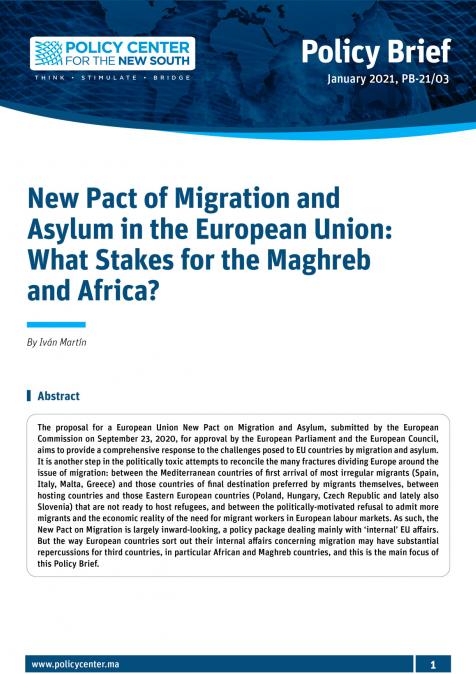In this interview with François Reybet-Degat, we explore the complex challenges and strategies involved in managing and mitigating refugee situations, especially in conflict-affected areas. We discuss how various regions, including both state and non-state actors, respond to the influx of refugees, taking into account political, economic, and social factors. The conversation also covers international cooperation, humanitarian aid, and policy frameworks designed to offer support and sustainable solutions for displaced populations. Reybet-Degat’s insights illuminate the intricacies of regional responses and the efforts to coordinate effective assistance and integration strategies.
RELATED CONTENT
-
AuthorsJanuary 8, 2021The proposal for a European Union New Pact on Migration and Asylum, submitted by the European Commission on September 23, 2020, for approval by the European Parliament and the European Council, aims to provide a comprehensive response to the challenges posed to EU countries by migration and asylum. It is another step in the politically toxic attempts to reconcile the many fractures dividing Europe around the issue of migration: between the Mediterranean countries of first arrival of ...
-
-
December 8, 2020COVID-19 showed how unprepared the health systems are to address major pandemics. Except for China, South Korea and Japan, countries have struggled to deal with the pandemic. Lockdowns and quarantines have been incentivised as a strategy. However, many countries have struggled economica...
-
 AuthorsSabine CessouDecember 4, 2020“Towards a more impactful leadership” Fluent in English, Yoruba, Portuguese, and Spanish, this US and Nigerian citizen, holding both passports, now lives in Medellin, Colombia. A perfect candidate for the Atlantic Dialogues Emerging Leaders program, she was selected in 2017 to follow the program and take part in the Atlantic Dialogues in Marrakech. Born in the USA 27 years ago, Idia Irele grew up between Nigeria and the U.S. and moved to Boston when she was 10. Her fam ...
AuthorsSabine CessouDecember 4, 2020“Towards a more impactful leadership” Fluent in English, Yoruba, Portuguese, and Spanish, this US and Nigerian citizen, holding both passports, now lives in Medellin, Colombia. A perfect candidate for the Atlantic Dialogues Emerging Leaders program, she was selected in 2017 to follow the program and take part in the Atlantic Dialogues in Marrakech. Born in the USA 27 years ago, Idia Irele grew up between Nigeria and the U.S. and moved to Boston when she was 10. Her fam ... -
December 2, 2020The interconnectedness and interdependence between countries around the world resulting from the rise of globalization has become a double-edged sword. On the positive side it has influenced socio-economic development, but it has also led to uncertainties that disrupt societies in terms...
-
AuthorsDecember 2, 2020Les relations politiques entre la Chine et l’Australie se sont fortement dégradées avec, à la clé, la mise en œuvre de la part du géant asiatique de barrières tarifaires et non tarifaires. Si les produits agricoles (orge, bœuf, vin, homards) ont été les premières matières premières à être touchées, les exportations australiennes de gaz naturel liquéfié pourraient également être dans le viseur de Pékin. Canberra dispose, néanmoins, d’une carte maîtresse : son minerai de fer dont le s ...
-
November 26, 2020The COVID-19 pandemic has shown, more than any other contemporary crisis, the need for concerted and coordinated actions between countries all over the world. However, the reluctance of many countries to work within traditional multilateral frameworks has pushed military organizations a...
-
 AuthorsNovember 25, 2020Coup sur coup, deux accords géants sont venus marquer l’actualité internationale. L’un, est économique et sonne comme un coup de tonnerre : c’est le RCEP (Regional Comprehensive Economic Partnership), vaste accord commercial asiatique, signé le 15 novembre 2020. Cette date restera dans l’histoire comme ayant associé la Chine à un ensemble de pays asiatiques. Il inclut l’ASEAN (Association des Nations d’Asie du Sud-est, à l’initiative de la démarche) mais, aussi, le Japon et la Corée ...
AuthorsNovember 25, 2020Coup sur coup, deux accords géants sont venus marquer l’actualité internationale. L’un, est économique et sonne comme un coup de tonnerre : c’est le RCEP (Regional Comprehensive Economic Partnership), vaste accord commercial asiatique, signé le 15 novembre 2020. Cette date restera dans l’histoire comme ayant associé la Chine à un ensemble de pays asiatiques. Il inclut l’ASEAN (Association des Nations d’Asie du Sud-est, à l’initiative de la démarche) mais, aussi, le Japon et la Corée ... -
AuthorsNovember 10, 2020The COVID-19 pandemic has been characterized by a shifting balance of power, with some analysts even predicting a new international order in the making. Emerging powers are contributing to the changing power dynamics by competing to increase the influence they have in political, economic, and security spheres. Africa is one of the key spaces where such strategic efforts have been taking place. In such a context, this paper assesses key drivers of emerging powers’ growing engagement ...
-
October 19, 2020To commemorate the 75th anniversary of the United Nations, the Policy Center for the New South is pleased to organize a series of webinars to discuss key themes related to the role of the UN on the international scene. Moderator: Mohammed Loulichki, Senior Fellow, Policy Center for the ...





